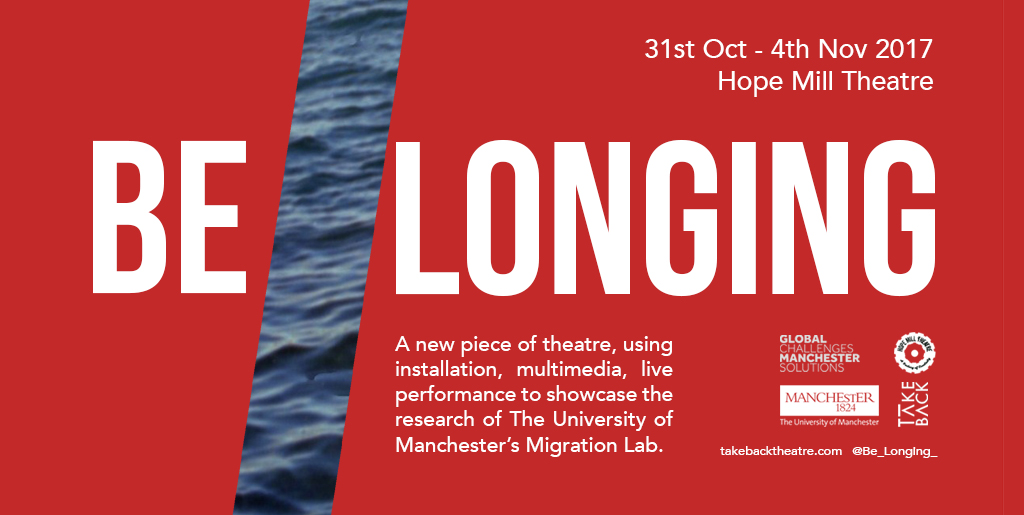
Creating a sense of belonging: How theatre gave our migration research a home
By Caroline Boyd, Global Inequalities Campaign Manager (Research Beacon)
When research provides you with human stories as emotive and keenly felt as those gathered by the 70+ researchers in the University’s Migration Lab, communication is not the biggest challenge. Instead drawing together and doing justice to the wide variety of experiences and stories is the daunting task.
So how could we clearly raise awareness of the range of Migration Lab researchers and their work which encompasses migration’s sociologic elements, humanitarian aspects, the legalities of moving country, the linguistic challenges and prejudices that many face as they move from one place to another? Theatre. read more…
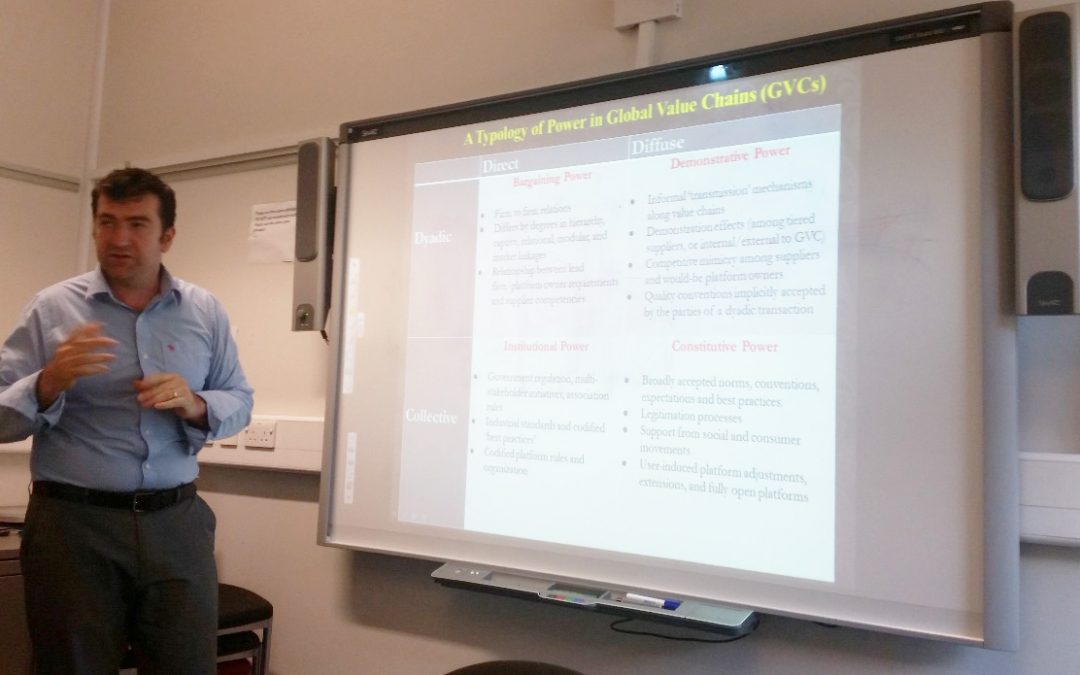
A master class with Mark Dallas: unpacking power in global value chains
Aarti Krishnan, Global Development Institute and the Overseas Development Institute
Governance and power form the core of value chain analysis; however, these two concepts are multilayered, complex and fuzzy. Both truly tick ‘the more I read, the less I think I know’ box. As value chain and production network scholars, we often use these terms, but in many ways, hope that someone else opens the ‘blackbox’ first. On demand from PhD students, the Global Production Networks, Trade and Labour research group at the Global Development Institute and the Department of Geography, decided to bring in someone who has braved the challenge to systematise these concepts. Enter: Mark Dallas, Associate Professor of Political Science and Asian Studies at Union College, who delivered an insightful lecture and masterclass on his research. read more…

In Conversation: Prof Dan Brockington and Dr Nicola Banks
For the few years, Dan Brockington of the Sheffield Institute for International Development and Nicola Banks of GDI, have been engaged on an epic project to map UK NGOs focused on development.
The database they have compiled on the 900 organisations that spend over £10,000 a year is a fascinating treasure trove. A scan of the day to day media coverage of development suggests a sector on the ropes, but this research shows the continuing rude health of NGOs in the UK.
read more…
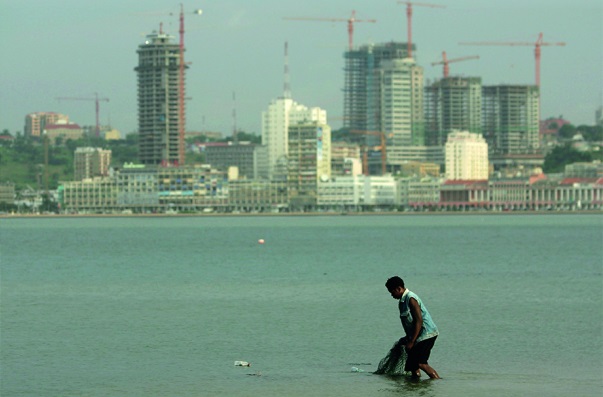
New book on the politics of growth from ESID researchers
We are pleased to announce that Deals and Development, a book resulting from Effective States and Inclusive Development research on the politics of growth, has been published. You can also read an Open Access version of the book here.
The book is edited by three leading thinkers on the politics of economic development, Lant Pritchett, Eric Werker and the GDI’s very own Kunal Sen. The book also featured chapters from GDI researchers; Sam Hickey, Pritish Behuria and Matthew Tyce. read more…
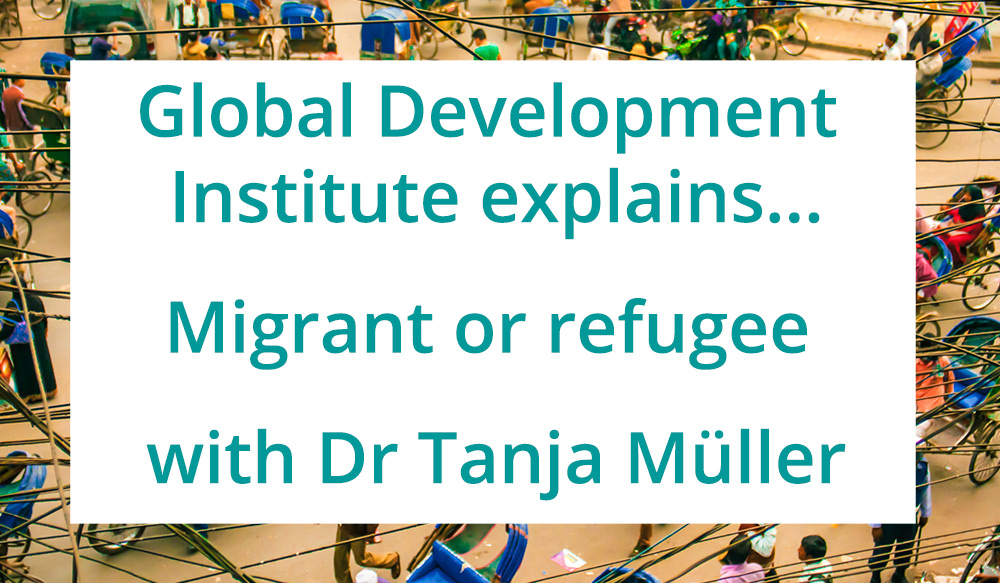
GDI Explains: Migrant or Refugee?
Global Development Institute explains brings together expert academics from across the Institute to explain key concepts in development studies.
Who is a refugee? How do you define words like ‘migrant’ and ‘asylum seeker’? Are these synonymous with ‘refugee’? As part of the Global Development Institute Explains series, Dr Tanja Müller presents ‘migrant or refugee’, and discusses the differences between these terms. The press, such as The Guardian, BBC and Al Jazeera, use such words for specific purposes, sometimes interchangeably and inconsistently. How are the distinctions made? How does the legal definition of ‘refugee’ for example diverge from how the term is used by media or understood by members of the public? Watch to find out.
Note: This article gives the views of the author/academic featured and does not represent the views of the Global Development Institute as a whole.
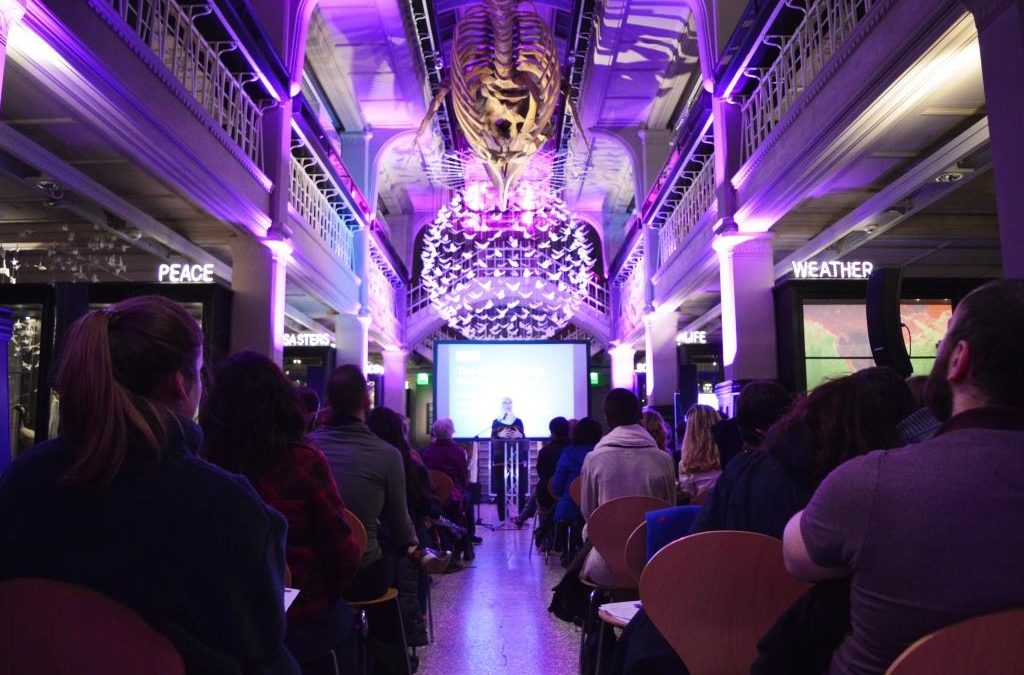
The White Helmets: devastation, borders and humanity
By Caroline Boyd, Global Inequalities Campaign Manager
Last night we hosted a free, public screening of The White Helmets at the Manchester Museum as part of the ESRC’s Festival of Social Sciences.
Around 60 members of the public attended the open event which also formed part of our ongoing commitment to public engagement around global inequalities – one of our five research beacons at The University of Manchester. read more…

Is sustainability a useful concept in development?
Dr Daniele Malerba, researcher at the German Development Institute for the project, Implementing the Agenda 2030: Integrating Growth, Environment, Equality and Governance and Honorary Research Fellow at the University of Manchester
Like two people falling in love, Development is nowadays rarely seen without Sustainability. And the latter changed the life of the former. For example, the Millennium Development Goals have become the Sustainable Development Goals (SDGs), culminating in the idea that development needs to be sustainable. But despite its established relevance, Sustainability might not be accepted by some of Development’s friends, for reasons I will try to outline later. Some evidence of this tension was given at the 2017 Annual Development Studies Association conference, the theme of which was “Sustainability Interrogated: Societies, Growth, and Social Justice”. GDI asked the conference participants: “Is sustainability a useful concept in development?” Nearly half of the voters (46%) indicated sustainability is a complicated concept, more than the voters indicating it as a central focus (36%); the minority (18%) did not think sustainability is a useful concept in development. Why is a science-driven concept like sustainability not thought of as useful by everybody? Why do Development’s friends think that Sustainability will not make Development’s life better? read more…
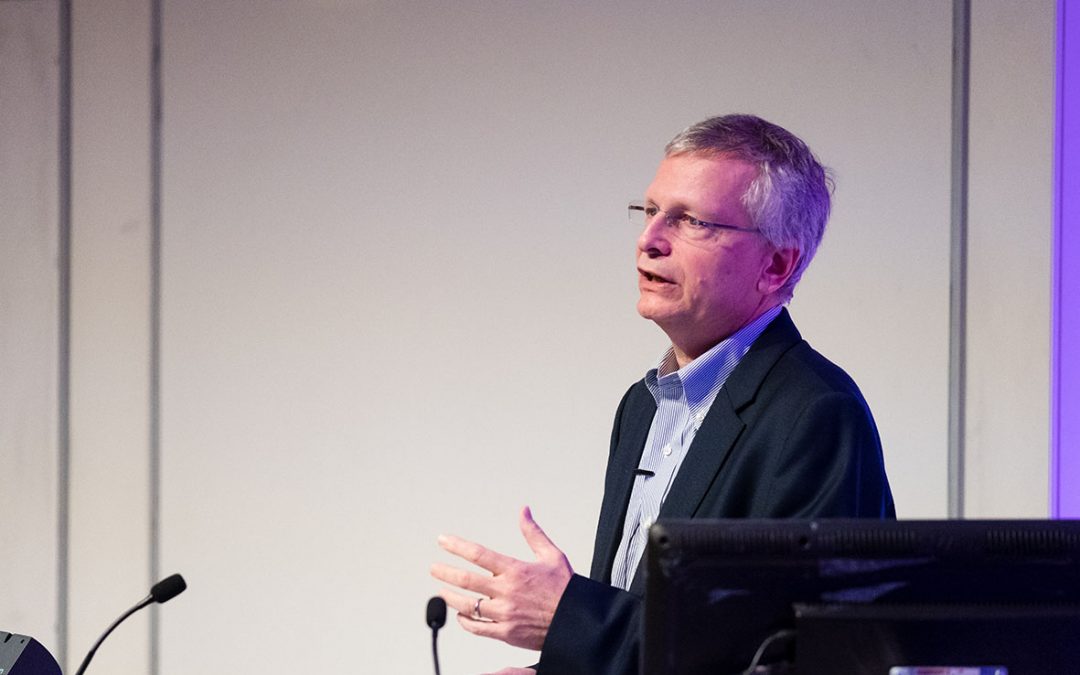
Shrinking manufacturing employment is “bad news for developing countries”
Andy Sumner, Reader in International Development in the Department of International Development, King’s College London and director of the ESRC Global Poverty & Inequality Dynamics (GPID) Research Network and Lukas Schlogl, Research Associate with the ESRC GPID Research Network at King’s College London.
What are the implications of premature deindustrialisation? What—if anything—is so special with manufacturing? How can we make sense of recent growth episodes in the developing world? What industrial and employment policies should be pursued?
The Global Development Institute at the University of Manchester and the ESRC Global Poverty & Inequality Dynamics Research Network co-hosted a PhD masterclass with Harvard’s Dani Rodrik to address these questions. read more…

“Can you say that again, but faster?” Research communications lessons from Instagram and storytelling
As we at the Global Development Institute like a challenge, we decided to foray into several slightly unconventional research communications methods in the past month. As our experiments with Instagram and storytelling demonstrated, engagement with new channels will require adapting what you say and how you say it, but the why never changes.
The two media of our choice, Instagram and spoken storytelling, appear diametrically opposed. One is based on pictures and 15-second videos, very much a product of the 21st century. The other one is a time-honoured practice that is central to how we perceive the world and ourselves. Nevertheless, both start from the same premise: what is the story? What is the kernel of truth within pages and pages of research findings to be shared with a larger audience?
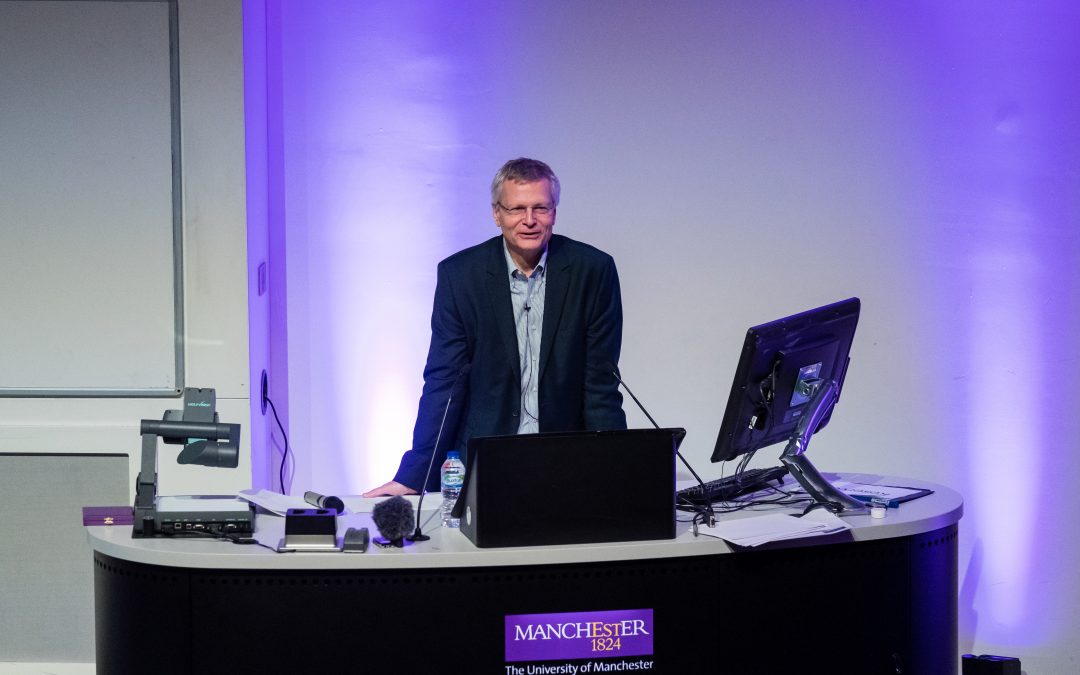
In Conversation: Prof David Hulme and Prof Dani Rodrik
Be a fly on the wall as GDI’s Executive Director, Prof David Hulme, interviews Prof Dani Rodrik, Ford Foundation Professor of International Political Economy at Harvard’s John F. Kennedy School of Government, about globalisation, inequality and trade, as well as the sociology of economists, how the decay of norms in liberal democracies might impact the rest of the world, what to be concerned about for India, and why China is always a surprise. They also discuss how Prof Rodrik’s research has led to an examination of populism, how populism differs in the developed and developing worlds, and how in most of the latter, populism is not “true” populism in its historical sense or definition.
read more…
